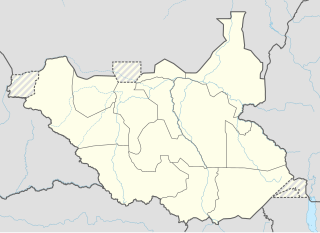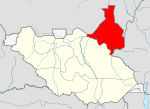
Khartoum or Khartum is the capital and largest city of Sudan. The city is also the capital of the state of Khartoum. It is located at the confluence of the White Nile, flowing north from Lake Victoria, and the Blue Nile, flowing west from Ethiopia. The location where the two Niles meet is known as al-Mogran or al-Muqran. The main Nile continues to flow north towards Egypt and the Mediterranean Sea.

The White Nile is a river in Africa, one of the two main tributaries of the Nile; the other is the Blue Nile. The name comes from colouring due to clay carried in the water.

Upper Nile was one of the ten states of South Sudan. The only governor of Upper Nile since the independence of South Sudan was Simon Kun Puoch The White Nile flowed through the state, giving it its name. The state also shared a similar name with the region of Greater Upper Nile, of which it was part along with the states of Unity and Jonglei. It had an area of 77,823 square kilometres (30,048 sq mi). Malakal was the capital of the state. The town of Kodok, the location of the Fashoda Incident that ended the "Scramble for Africa", was located in the state. Upper Nile seceded from Sudan as part of the Republic of South Sudan on 9 July 2011.

Blue Nile is one of the eighteen states of the Republic of Sudan. It was established by presidential decree nº 3 in 1992 and is named after the Blue Nile River.

Jonglei is a state of South Sudan. On 2 October 2015 the President Salva Kiir Mayardit decreed the creation of the new Jonglei State along with 27 other states replacing 10 previous states. The earlier Jonglei state comprised three counties of Bor, Twic East and Duk and was the largest state by area before reorganisation, with approximately 122,581 km2, as well as the most populous according to the controversial 2008 census conducted during present-day South Sudan's second period of autonomy. Bor is the capital of the state.

Bentiu, also spelled Bantiu, is a town in South Sudan and capital of the state of Northern Liech.
Sudanese Americans are Americans of Sudanese ancestry, or Sudanese who have American citizenship. Sudanese Americans may also include children born in United States to an American parent and Sudanese parent. Many Sudanese emigrated to United States in the 1990s as war refugees, escaping of civil war in Sudan. In the 2012 American Community Survey, 48,763 people identified themselves as Sudanese or Sudanese Americans who—or whose ancestors—have emigrated from their native land to the U.S. in the 1980s, 1990s and 2000s.

The States of South Sudan were created out of the three historic former provinces of Bahr el Ghazal (northwest), Equatoria (southern), and Greater Upper Nile (northeast). The 32 states are further divided into 180 counties.
Sudanese refugees are persons originating from the country of Sudan, but seeking refuge outside the borders of their native country. In recent history, Sudan has been the stage for prolonged conflicts and civil wars, as well as environmental changes, namely desertification. These forces have resulted not only in violence and famine, but also the forced migration of large numbers of the Sudanese population, both inside and outside the country's borders. Given the expansive geographic territory of Sudan, and the regional and ethnic tensions and conflicts, much of the forced migration in Sudan has been internal. Yet, these populations are not immune from similar issues that typically accompany refugeedom, including economic hardship and providing themselves and their families with sustenance and basic needs. With the creation of a South Sudanese state, questions surrounding southern Sudanese IDPs may become questions of South Sudanese refugees.

The Sudanese conflict in South Kordofan and Blue Nile, also referred to by some media as the Third Sudanese Civil War, is an ongoing armed conflict in the Sudanese southern states of South Kordofan and Blue Nile between the Sudanese Army (SAF) and Sudan People's Liberation Movement-North (SPLM-N), a northern affiliate of the Sudan People's Liberation Movement (SPLM) in South Sudan. After some years of relative calm following the 2005 agreement which ended the second Sudanese civil war between the Sudanese government and SPLM rebels, fighting broke out again in the lead-up to South Sudan independence on 9 July 2011, starting in South Kordofan on 5 June and spreading to the neighboring Blue Nile state in September. SPLM-N, splitting from newly-independent SPLM, took up arms against the inclusion of the two southern states in Sudan with no popular consultation and against the lack of democratic elections. The conflict is intertwined with the War in Darfur, since in November 2011 SPLM-N established a loose alliance with Darfuri rebels, called Sudan Revolutionary Front (SRF).

General Paul Malong Awan Anei is a South Sudanese politician and military figure. He formerly served as governor of Northern Bahr el Ghazal from 27 March 2008 to 2014.
Baliet is an administrative county in the Central Upper Nile, South Sudan. The County headquarters is Baliet town, located on north of Sobat River bank and 20 km south east of Malakal, the Capital city of Upper Nile State.
Jamam was a refugee camp in Maban County, Upper Nile state, South Sudan.
Prostitution in South Sudan is legal but related activities such as soliciting or brothel-keeping are illegal.
South Sudanese Americans are Americans of South Sudanese ancestry, or South Sudanese people who have American citizenship. South Sudanese Americans can include children born in United States to South Sudanese and Americans parents, and children of parents who are both South Sudanese. According to former Amabassador Ezekiel Lol Gatkuoth, more than 100,000 southern Sudanese live in the US, whose ancestors emigrated from their native country, mainly in the 1980s and 1990s. Many South Sudanese have moved to the US since the 1990s as war refugees, escaping civil war in Sudan and the refugee camps in Africa.

Paloich Airport, Heliport is the airport in Eastern Nile in South Sudan which provides transport operations for the adjacent Palogue oil field and the settlement Paloich.

Eastern Nile is one of the 28 states of South Sudan formed on 2 October 2015. It is located in the Greater Upper Nile region and it was part of the former states of Upper Nile and Jonglei. The state borders the states of Eastern Bieh, Latjoor, Western Bieh, Western Nile, and the country of Ethiopia to the east.
South Sudanese refugees are persons originating from the African country of South Sudan, but seeking refuge outside the borders of their native country. The world's youngest independent country has a recent and troubled history of prolonged conflicts and climate change, namely desertification. These forces have resulted not only in violence and famine, but also the forced migration of large numbers of the population, both inside and outside the country's borders. South Sudan was cited as the largest refugee crisis in 2016, being the world's third largest, followed by Syria and Afghanistan.














